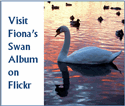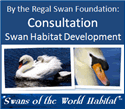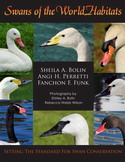Ask the Swan Specialist
Date: 1 March 2015
Hi Julian:
Thanks for you kind comments.
You cannot tell a male from a female swan at 5 months of age, regardless of species. The male genitalia has not completely formed, so what you might see or not see during probing is not a reliable indicator. If you are planning on probing or observation, you will need to wait and even then, you may not be 100% sure until mating nesting begins (2-3 years) down the road.
The most reliable indicator is to take a feather sample (you need a veterinarian to do this as there needs to be some blood present to get a valid sample) and then submit it to a reliable laboratory for DNA Sequencing.
You should use cracked corn 50% and poultry layer pellets 50%. If the layer pellets are being fed to poultry, then the anti-coccidal additives should not be a problem. The last thing a poultry farmer, especially egg producers want is a sick or dead bird from something they have eaten. So, you might check with a poultry farmer to be sure that there is not another product on the market and/or that the one you have is safe for consumption.
There is a vaccine on the market for poultry and waterfowl against New Castle's disease. However, you will need to check with a local veterinarian. In Florida and warmer climates, we do not tend to see this disease, however, if it is present in surrounding poultry farms, etc., then it is plausible that the swans could get infected. We tend to see more Botulism and West Nile Virus issues with swans in warmer climates, thus we pioneered the use of two vaccines to mitigate their deaths from these two issues.
You have a wonderful resource regarding Black Swans in Australia. Jon Coleman and his dad Bert (a very prominent researcher in Mute Swans in England) had worked with swans for many years. Jon lives in Australia and works frequently with Black Swan populations. His email is: janetandjon AT hotmail.com
He should be able to answer questions regarding New Castle disease in Black Swans, specifically in Australia or provide you with some resources. We hope that this information is of benefit. The Regal Swan
Messages In This Thread
- How to feed black swans? Vaccinate against New Castle disease? -- Julian -- 1 March 2015
- Re: How to feed black swans? Vaccinate against New Castle disease? -- The Regal Swan -- 1 March 2015
- Re: How to feed black swans? Vaccinate against New Castle disease? -- Julian -- 2 March 2015
- Re: How to feed black swans? Vaccinate against New Castle disease? -- The Regal Swan -- 3 March 2015
- Re: How to feed black swans? Vaccinate against New Castle disease? -- Julian -- 9 March 2015
- Re: How to feed black swans? Vaccinate against New Castle disease? -- The Regal Swan -- 10 March 2015
- Re: How to feed black swans? Vaccinate against New Castle disease? -- Julian -- 11 March 2015
- Re: How to feed black swans? Vaccinate against New Castle disease? -- The Regal Swan -- 11 March 2015
- Re: How to feed black swans? Vaccinate against New Castle disease? -- Julian -- 11 March 2015
- Re: How to feed black swans? Vaccinate against New Castle disease? -- The Regal Swan -- 11 March 2015
- Re: How to feed black swans? Vaccinate against New Castle disease? -- Julian -- 27 April 2015
- Re: How to feed black swans? Vaccinate against New Castle disease? -- The Regal Swan -- 27 April 2015
- Re: How to feed black swans? Vaccinate against New Castle disease? -- Julian -- 27 April 2015
- Re: How to feed black swans? Vaccinate against New Castle disease? -- The Regal Swan -- 11 March 2015
- Re: How to feed black swans? Vaccinate against New Castle disease? -- Julian -- 11 March 2015
- Re: How to feed black swans? Vaccinate against New Castle disease? -- The Regal Swan -- 11 March 2015
- Re: How to feed black swans? Vaccinate against New Castle disease? -- Julian -- 11 March 2015
- Re: How to feed black swans? Vaccinate against New Castle disease? -- The Regal Swan -- 10 March 2015
- Re: How to feed black swans? Vaccinate against New Castle disease? -- Julian -- 9 March 2015
- Re: How to feed black swans? Vaccinate against New Castle disease? -- The Regal Swan -- 3 March 2015
- Re: How to feed black swans? Vaccinate against New Castle disease? -- Julian -- 2 March 2015
- Re: How to feed black swans? Vaccinate against New Castle disease? -- The Regal Swan -- 1 March 2015
Ask the Swan Specialist is powered by
Tetra-WebBBS 5.30 Beta © 2006-2007 Tetra-Team






